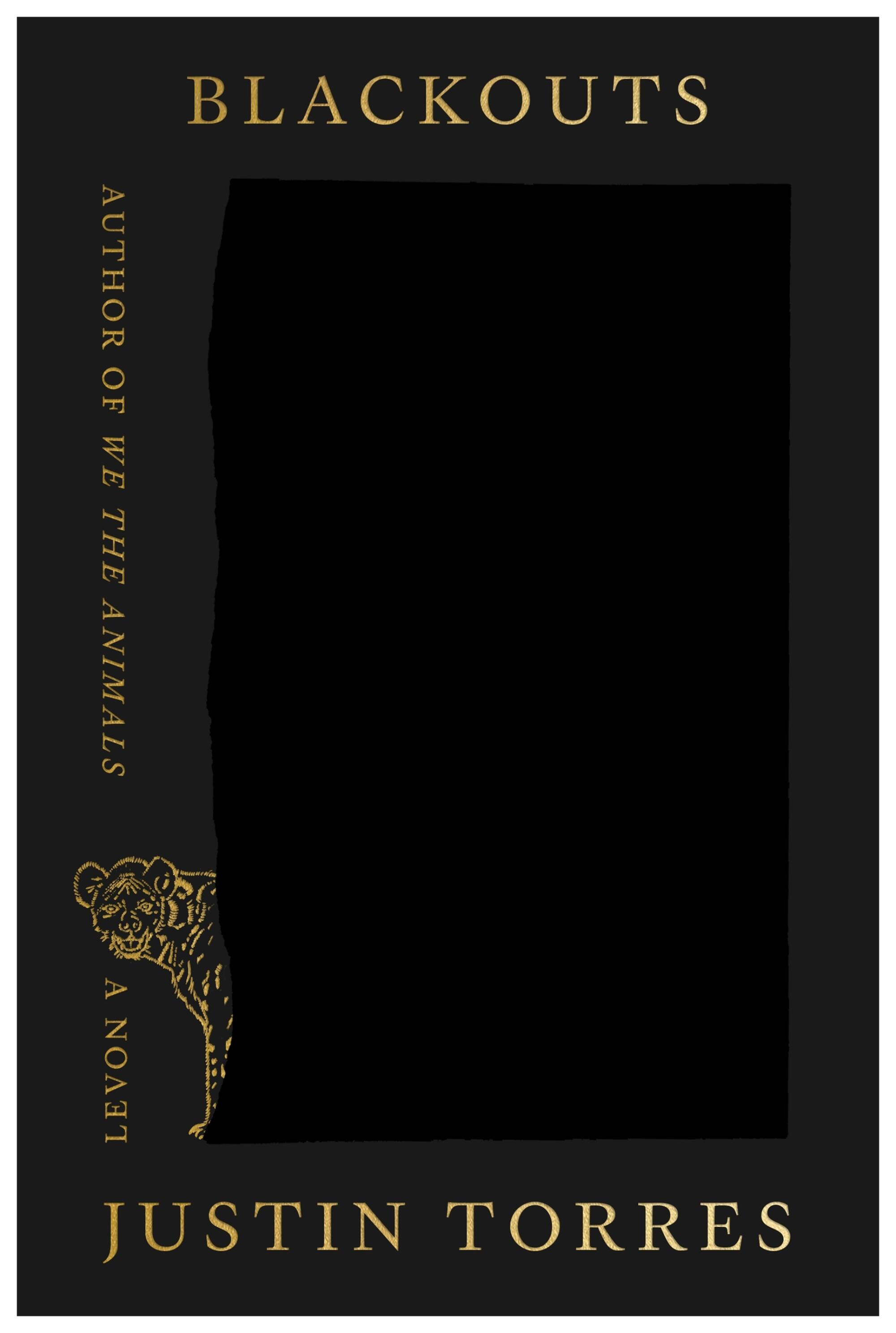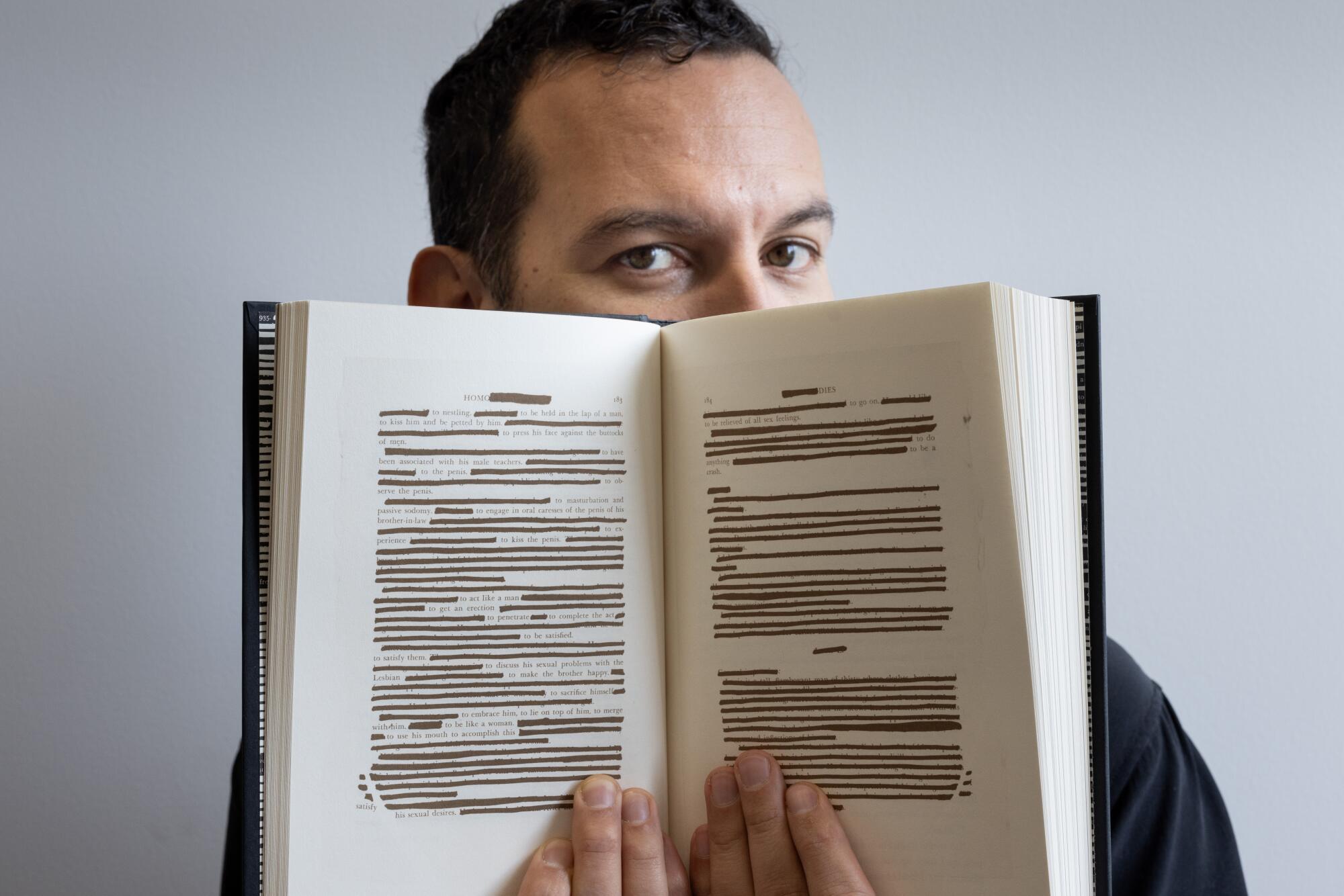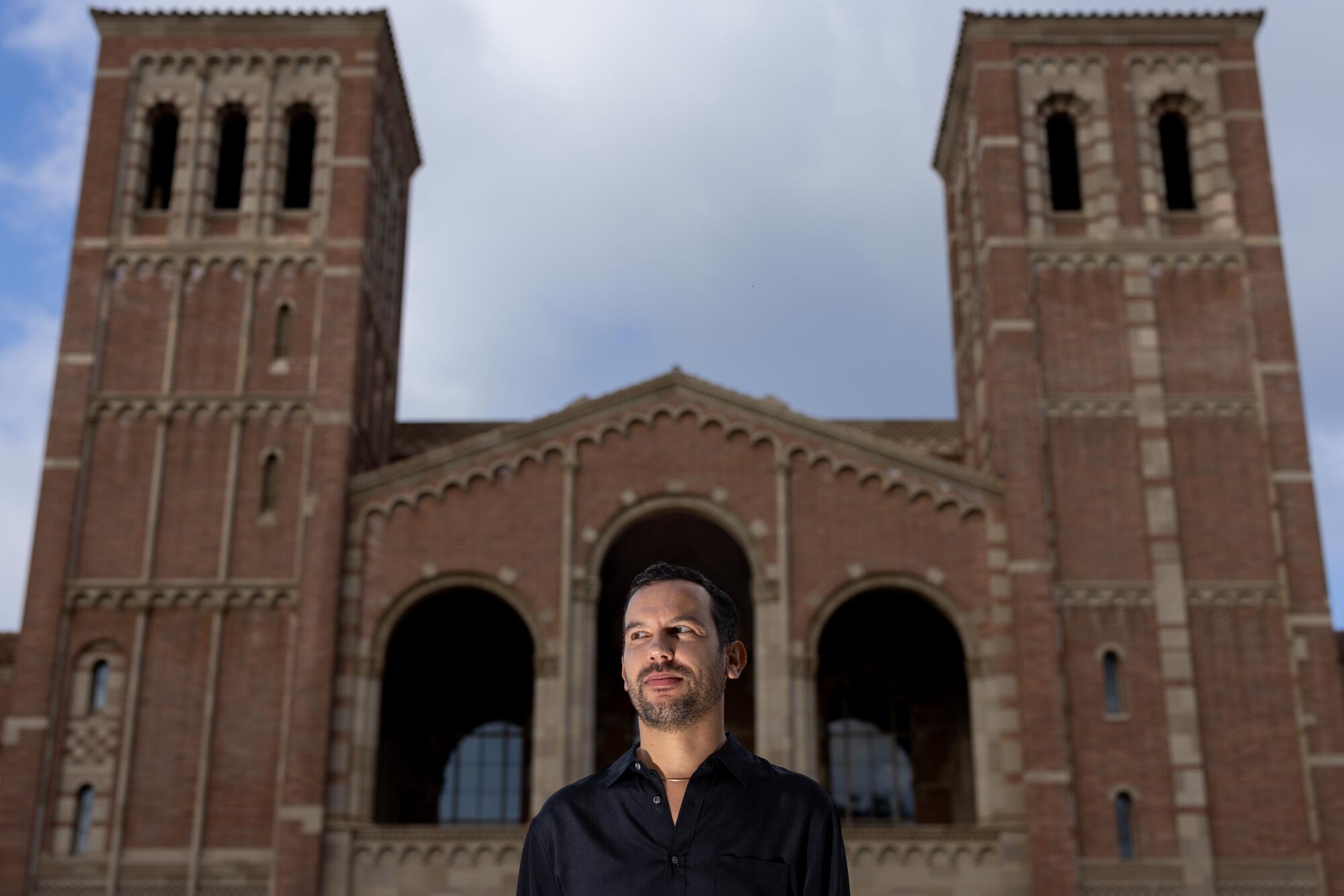On the Shelf
Blackouts
By Justin Torres
FSG: 320 pages, $30
When you purchase books linked on our website, The Instances could earn a fee from Bookshop.org, whose charges help unbiased bookstores.
Justin Torres has a good excuse for taking 12 years to write down his second e-book. Roughly 9 years in the past, the novelist was on a fellowship in France, trucking alongside on a draft a couple of younger homosexual intercourse employee, when sooner or later he misplaced the manuscript on a practice.
“I lose every thing on a regular basis,” Torres, 43, defined throughout a latest interview in his workplace at UCLA, the place he’s a professor of English. “I’m educated in a sure sort of radical acceptance.”
In actual fact, he didn’t even really feel resigned, he recollects. He felt free.
The transfer gave him cowl from his editor to spend extra time studying — Manuel Puig, Juan Rulfo and others — in the hunt for the inspiration to strive one thing utterly totally different. “I actually needed to alter the way in which I wrote,” he defined.
The result’s “Blackouts,” an experimental journey into the annals of queer historical past that’s equal components intergenerational love letter and homoerotic fever dream.
Torres’ first novel was a extra easy affair. In 2011, then a latest MFA graduate of the Iowa Writers’ Workshop, he had a splashy debut with “We the Animals,” a semi-autobiographical coming-of-age story about three biracial brothers rising up in a chaotic lower-class family in upstate New York.
Over the following few years, the e-book was translated into 15 languages and tailored right into a characteristic movie starring Raúl Castillo. Torres toured all around the nation, accomplished fellowships at Harvard and Stanford and secured tenure at UCLA.

(Farrar, Straus and Giroux)
Sitting at his desk contained in the college’s Kaplan Corridor, Torres exudes a professorial high quality — at the same time as he cops to the irony of being an educational regardless of by no means graduating school himself. Raised in a small city outdoors Syracuse, N.Y, he enrolled and dropped out of a number of universities throughout his tumultuous 20s in New York and the Bay Space.
Torres was working a shift at a used bookstore in San Francisco when he found the textual content that made “Blackouts” attainable. Scattered all through his workplace bookshelves are a number of copies of the aged, nondescript quantity: “Intercourse Variants: A Examine of Gay Patterns.” Revealed in 1941, the report examined the lives of 40 homosexual males and 40 lesbian girls; it was one of many few predecessors to Alfred Kinsey’s groundbreaking analysis into human sexual conduct.
Whereas writing after which selling “We the Animals,” Torres discovered himself coming again to his difficult emotions in regards to the research, which provided a glimpse into how the scientific neighborhood tried to grasp queer individuals — even because it alienated them as topics.
“He already had the seeds of this e-book in thoughts,” stated Jenna Johnson, who edited each “We the Animals” and “Blackouts.” “It was germinating.”
Torres stated he was struck by the medical writing model in “Intercourse Variants,” which he discovered dehumanizing. “When you look in queer historical past, a lot is concerned in this type of medical, pathological readings of queerness itself,” Torres stated. “You’ll be able to’t have a look at our historical past and fake that homosexuality wasn’t [considered] a psychological sickness till the ‘70s — you may’t ignore that.”
So Torres determined to carry out his personal erasure, crossing out the pathologizing language in “Intercourse Variants” after which crossing out extra, till all that was left had been phrases and phrases born into a completely new context: a line of verse.

Torres holds his novel, “Blackouts,” open to pages stuffed with erasures he made to a 1941 research of homosexuality, which impressed the narrative in his second novel.
(Jay L. Clendenin / Los Angeles Instances)
The closely redacted poems — an instance of what’s often known as “erasure poetry” — turned the titular “Blackouts” of Torres’ second novel, which follows a younger male narrator in dialog with Juan Homosexual, an ageing, erudite homosexual man on his deathbed. Homosexual was raised by Jan Homosexual, a real-life sexologist whose analysis was closely used however barely credited in “Intercourse Variants.”
A tribute to forgotten queer historical past, “Blackouts” forges a lineage with erased trailblazers. And although it isn’t autobiographical, its themes of pathology and queerness are deeply private; Torres was institutionalized for months simply after he graduated highschool. He declined to elaborate on the circumstances, however the expertise formed him profoundly.
In “Blackouts,” the narrator and Juan Homosexual first meet as inmates in a psychological establishment. After a formative encounter on the hospital, they go their separate methods till the narrator visits Homosexual at his dwelling within the southwestern desert — a spot known as The Palace.
The majority of the novel’s conversations happen throughout Juan’s last days. Homosexual hopes the narrator will stick with it the challenge of his life’s work: organizing and archiving pages of “Intercourse Variants” that unknown researchers had redacted, working to revive the voices and tales of Jan Homosexual and others.
…
Per week earlier than “Blackouts” was revealed in October, it was named a finalist for a 2023 Nationwide E book Award in fiction. (The winner might be introduced Nov. 15.) Torres stated the information was like “being struck by lightning in a great way.”
The popularity affirms “Blackouts” is a level-up for Torres, however the important thing to his work lies extra in what it shares along with his debut — components of literary model and substance that had been labored out not in lecture rooms, however by lived expertise.
There’s, as an illustration, Torres’ distinctive voice. Although the narrators of “We the Animals” and “Blackouts” sound utterly totally different, they share a distilled lyricism that’s uncommon in up to date prose.
“I all the time say he’s like a poet, as a result of there’s such consideration to element to each single phrase,” stated the novelist Angela Fluornoy, who met Torres when each attended the Iowa Writers’ Workshop and has since turn out to be one in every of his closest pals.
Torres readily summons a particular story behind his obsession with craft. As a baby within the Eighties, his household owned a phrase processor with a display that allowed one to view and edit only a couple traces of writing at a time.
“The factor about writing fiction is you’ve gotten whole management, and each phrase issues, and also you assume a lot about placement and order,” he stated.
Simply as hanging is the construction of his novels, each organized not in discrete chapters however relatively as a sequence of vignettes — snippets of conversations and recollections that shift voices, timing and perspective.
“The vignette might be the constant factor that I’m certain might be throughout each e-book I ever write,” Torres stated. “It’s simply the way in which my thoughts composes narrative.”
Between every of its vignettes, “Blackouts” options dozens of photographs; some are the titular blackout poems, however there are additionally archival photographs, diagrams and illustrations. The impact is of a dialogue not simply between characters however between textual content and picture.
“I feel a giant piece of determining the right way to inform this story was that form of realization that this was a dialogue, a novel in dialogue,” stated Johnson, his editor. “And that that dialogue was going down outdoors of time.”
This dialogue additionally emerged from Torres’ private life. Within the acknowledgments for “Blackouts,” he credit David Russell, his companion, for uplifting the novel’s uncommon construction: “I by no means would have conceived of writing a e-book that takes the type of one lengthy dialog, if not for the truth that ten years in the past we started a dialog we promised by no means to finish.”

Torres’ personal expertise educating and dealing at UCLA — the analysis, the service, the mentorship — proved important in reaching his acknowledged objective of by no means writing the identical means twice.
(Jay L. Clendenin / Los Angeles Instances)
Russell, a literary scholar, is now a tenured colleague of Torres’ within the UCLA English division, however he taught at Oxford till earlier this 12 months. Being in a long-term, long-distance relationship was not with out its challenges, nevertheless it felt — as “Blackouts” does — like a dialogue outdoors of time.
Xuan Juliana Wang, one other English division colleague who has recognized Torres since they had been each at Stanford’s Wallace Stegner Fellowship, teaches “We the Animals” to her college students for its distinctive second-person plural narration. However with “Blackouts,” she stated: “It’s the language that carries you over — it retains you hooked from web page to web page.”
Torres’ personal expertise educating and dealing at UCLA — the analysis, the service, the mentorship — proved important in reaching his acknowledged objective of by no means writing the identical means twice.
“I discovered the right way to write” whereas engaged on the primary novel, Torres stated. “And as soon as I discovered a sure sort of model, I used to be like: I don’t wish to do that once more.”
He feels that means, too, about “Blackouts” in the case of his subsequent novel, which he’ll embark on quickly after he’s accomplished touring for the Nationwide E book Awards and a handful of end-of-year occasions. It’s tentatively known as “The Rule of Three,” and similar to “We the Animals,” it tells the story of three brothers. Although it would sound like a return to autobiographical materials, with the characters now of their 40s, it received’t be a sequel, and will probably be informed in a very totally different means.
Additionally, this time, he plans to again up his recordsdata — tempting as it might be to power himself to start out over once more.
“It’s straightforward to inform your editor ‘I misplaced a manuscript,’” Torres stated with amusing. “Everyone feels dangerous for you, and then you definately get to waste extra time.”
#UCLA #writer #Justin #Torres #wrote #Blackouts
